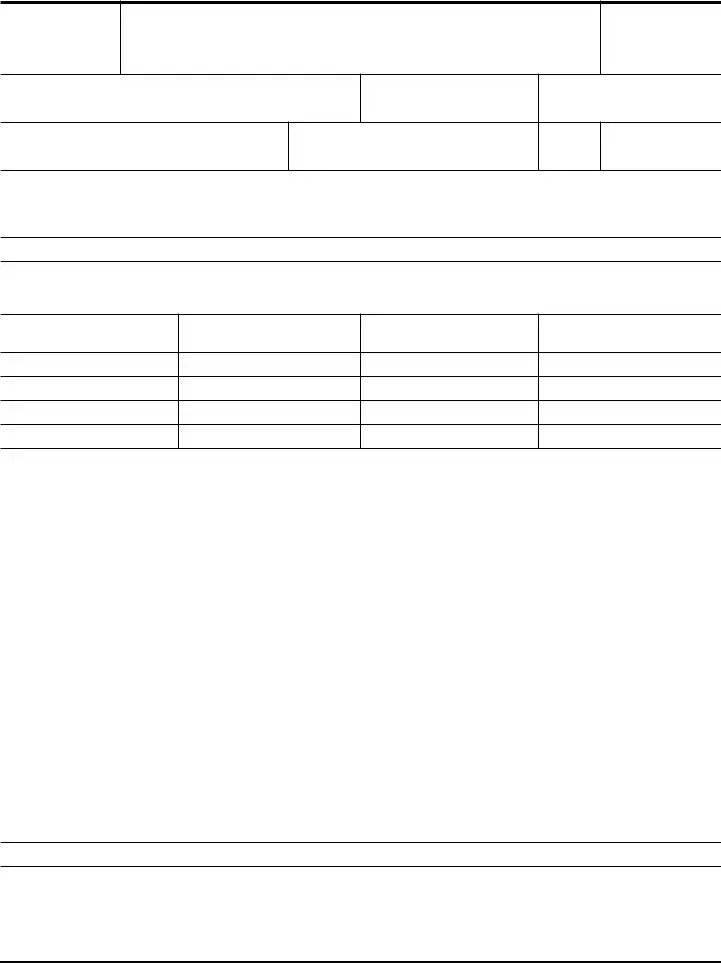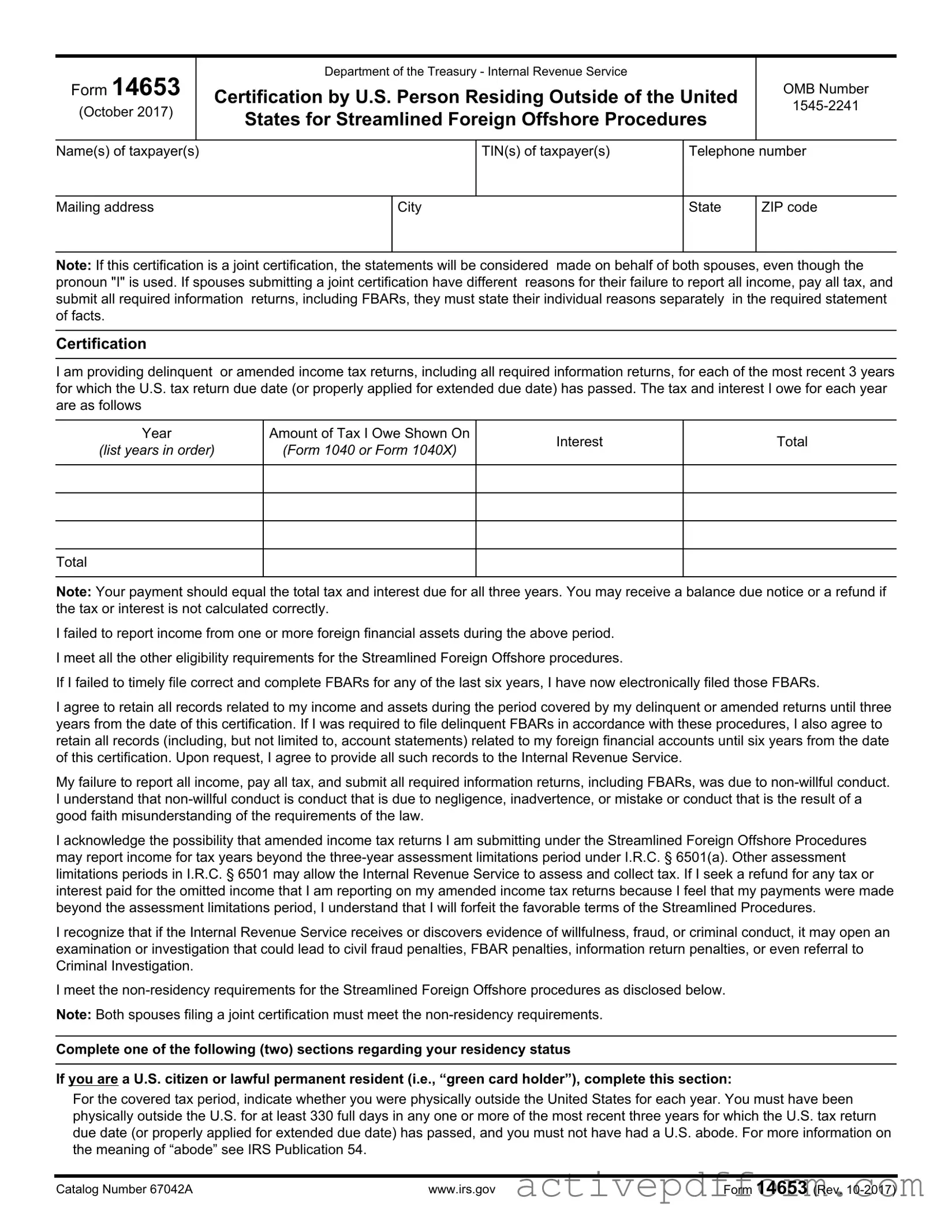Free 14653 Template
The 14653 form is a crucial document for U.S. persons living outside the United States who need to address their tax compliance issues. This form serves as a certification for individuals wishing to participate in the Streamlined Foreign Offshore Procedures. It allows them to rectify past failures to report income, pay taxes, and submit required information returns, including Foreign Bank Account Reports (FBARs). The form requires taxpayers to provide details about their residency status, including the number of days spent outside the U.S. in recent years. It also mandates a clear explanation of the reasons for any non-compliance, ensuring that both favorable and unfavorable facts are disclosed. Taxpayers must also calculate and report any tax and interest owed for the past three years. Importantly, the form emphasizes the need for accurate record-keeping and the commitment to retain relevant documents for a specified period. Understanding the requirements and implications of the 14653 form can help individuals navigate their tax obligations with confidence and clarity.
Document Specifics
| Fact Name | Description |
|---|---|
| Purpose of Form | Form 14653 is used by U.S. persons residing outside the United States to certify their eligibility for the Streamlined Foreign Offshore Procedures. |
| Eligibility Requirements | To qualify, individuals must have failed to report income, pay taxes, or submit required returns due to non-willful conduct, such as negligence or misunderstanding of tax laws. |
| Joint Certification | If spouses file jointly, both must meet the non-residency requirements and provide separate statements if their reasons for non-compliance differ. |
| Retention of Records | Taxpayers must retain all records related to income and assets for three years after certification, and FBAR records for six years if applicable. |
| Assessment Limitations | Amended returns may report income beyond the three-year assessment period, but doing so may forfeit the favorable terms of the Streamlined Procedures. |
| Governing Law | This form is governed by the Internal Revenue Code, specifically sections related to tax compliance and penalties. |
Similar forms
- Form 1040: This is the standard individual income tax return form used by U.S. taxpayers to report their income, claim deductions, and calculate their tax liability. Similar to Form 14653, it requires detailed information about income sources and tax obligations.
- Form 1040X: This form is used to amend a previously filed Form 1040. Like Form 14653, it allows taxpayers to correct errors or make changes to their tax filings, ensuring compliance with tax laws.
- Form 8938: Known as the Statement of Specified Foreign Financial Assets, this form is required for certain U.S. taxpayers with foreign assets. It shares similarities with Form 14653 in that both address foreign financial interests and require disclosure of such assets.
- FBAR (FinCEN Form 114): The Report of Foreign Bank and Financial Accounts must be filed by U.S. persons with foreign accounts exceeding a certain threshold. Both forms aim to ensure compliance with reporting foreign financial interests.
- Form 3520: This form is used to report transactions with foreign trusts and receipt of certain foreign gifts. Like Form 14653, it addresses international financial matters and requires detailed disclosures.
NYC Housing Application Form: This important document allows individuals to express interest in public housing in New York City. To learn more about how to complete this form, visit nytemplates.com/blank-nyc-housing-application-template/.
- Form 5471: This is an information return for U.S. citizens and residents who are officers, directors, or shareholders in certain foreign corporations. Both forms involve reporting foreign financial interests and compliance with U.S. tax obligations.
- Form 8865: Used to report information regarding foreign partnerships, this form is similar to Form 14653 in that it requires U.S. taxpayers to disclose foreign financial interests and comply with tax reporting requirements.
- Form 1116: This form allows taxpayers to claim a foreign tax credit for taxes paid to foreign governments. Both forms deal with international tax issues and aim to prevent double taxation.
- Form 8833: This is used to disclose a treaty-based return position. Like Form 14653, it involves international tax matters and requires taxpayers to provide specific information regarding their tax situation.
14653 Example

Form 14653
(October 2017)
Department of the Treasury - Internal Revenue Service
Certification by U.S. Person Residing Outside of the United
States for Streamlined Foreign Offshore Procedures
OMB Number
Name(s) of taxpayer(s)
TIN(s) of taxpayer(s)
Telephone number
Mailing address
City
State
ZIP code
Note: If this certification is a joint certification, the statements will be considered made on behalf of both spouses, even though the pronoun "I" is used. If spouses submitting a joint certification have different reasons for their failure to report all income, pay all tax, and submit all required information returns, including FBARs, they must state their individual reasons separately in the required statement of facts.
Certification
I am providing delinquent or amended income tax returns, including all required information returns, for each of the most recent 3 years for which the U.S. tax return due date (or properly applied for extended due date) has passed. The tax and interest I owe for each year are as follows
Year
(list years in order)
Amount of Tax I Owe Shown On
(Form 1040 or Form 1040X)
Interest
Total
Total
Note: Your payment should equal the total tax and interest due for all three years. You may receive a balance due notice or a refund if the tax or interest is not calculated correctly.
I failed to report income from one or more foreign financial assets during the above period.
I meet all the other eligibility requirements for the Streamlined Foreign Offshore procedures.
If I failed to timely file correct and complete FBARs for any of the last six years, I have now electronically filed those FBARs.
I agree to retain all records related to my income and assets during the period covered by my delinquent or amended returns until three years from the date of this certification. If I was required to file delinquent FBARs in accordance with these procedures, I also agree to retain all records (including, but not limited to, account statements) related to my foreign financial accounts until six years from the date of this certification. Upon request, I agree to provide all such records to the Internal Revenue Service.
My failure to report all income, pay all tax, and submit all required information returns, including FBARs, was due to
I acknowledge the possibility that amended income tax returns I am submitting under the Streamlined Foreign Offshore Procedures may report income for tax years beyond the
I recognize that if the Internal Revenue Service receives or discovers evidence of willfulness, fraud, or criminal conduct, it may open an examination or investigation that could lead to civil fraud penalties, FBAR penalties, information return penalties, or even referral to Criminal Investigation.
I meet the
Note: Both spouses filing a joint certification must meet the
Complete one of the following (two) sections regarding your residency status
If you are a U.S. citizen or lawful permanent resident (i.e., “green card holder”), complete this section:
For the covered tax period, indicate whether you were physically outside the United States for each year. You must have been physically outside the U.S. for at least 330 full days in any one or more of the most recent three years for which the U.S. tax return due date (or properly applied for extended due date) has passed, and you must not have had a U.S. abode. For more information on the meaning of “abode” see IRS Publication 54.
Catalog Number 67042A |
www.irs.gov |
Form 14653 (Rev. |

Page of
I was physically outside the United States for at least 330 full days (answer Yes or No for each year)
Year
Yes
No
Both spouses filing a joint certification must meet the
If you are not a U.S. citizen or lawful permanent resident, complete this section:
If you are not a U.S. citizen or a lawful permanent resident, please attach to this certification your computation showing that you did not meet the substantial presence test under I.R.C. sec. 7701(b)(3). Your computation must disclose the number of days you were present in the U.S. for the three years included in your Streamlined Foreign Offshore Procedures submission and the previous two years. If you do not attach a complete computation showing that you did not meet the substantial presence test, your submission will be considered incomplete and your submission will not qualify for the Streamlined Foreign Offshore Procedures.
Both spouses filing a joint certification must meet the
Note: You must provide specific facts on this form or on a signed attachment explaining your failure to report all income, pay all tax, and submit all required information returns, including FBARs. Any submission that does not contain a narrative statement of facts will be considered incomplete and will not qualify for the streamlined penalty relief.
Provide specific reasons for your failure to report all income, pay all tax, and submit all required information returns, including FBARs. Include the whole story including favorable and unfavorable facts. Specific reasons, whether favorable or unfavorable to you, should include your personal background, financial background, and anything else you believe is relevant to your failure to report all income, pay all tax, and submit all required information returns, including FBARs. Additionally, explain the source of funds in all of your foreign financial accounts/assets. For example, explain whether you inherited the account/asset, whether you opened it while residing in a foreign country, or whether you had a business reason to open or use it. And explain your contacts with the account/asset including withdrawals, deposits, and investment/ management decisions. Provide a complete story about your foreign financial account/asset. If you relied on a professional advisor, provide the name, address, and telephone number of the advisor and a summary of the advice. If married taxpayers submitting a joint certification have different reasons, provide the individual reasons for each spouse separately in the statement of facts. The field below will automatically expand to accommodate your statement of facts.
Catalog Number 67042A |
www.irs.gov |
Form 14653 (Rev. |

Page of
Under penalties of perjury, I declare that I have examined this certification and all accompanying schedules and statements, and to the best of my knowledge and belief, they are true, correct, and complete.
Signature of Taxpayer |
Name of Taxpayer |
Date |
|
|
|
Signature of Taxpayer (if joint certification) |
Name of Taxpayer (if joint certification) |
Date |
|
|
|
For Estates Only
Signature of Fiduciary |
Date |
|
|
Title of Fiduciary (e.g., executor or administrator)
Name of Fiduciary
For Paid Preparer Use Only (the signature of taxpayer(s) or fiduciary is required even if this form is signed by a paid preparer)
Signature of Preparer |
Name of Preparer |
|
|
Date |
|
|
|
|
|
Firm’s name |
|
|
|
Firm’s EIN |
|
|
|
|
|
Firm’s address |
City |
|
State |
ZIP code |
|
|
|
|
|
Telephone number |
PTIN |
|
|
Check if |
|
|
|
|
|
|
|
|
|
|
|
|
|
|
|
Do you want to allow another person to discuss this form with the IRS |
Yes (complete information below) |
No |
||
|
|
|
|
|
Designee’s name |
|
|
Telephone number |
|
|
|
|
|
|
Privacy Act and Paperwork Reduction Notice
We ask for the information on this certification by U.S. person residing in the United States for streamlined domestic offshore procedures to carry out the Internal Revenue laws of the United States. Our authority to ask for information is sections 6001, 6109, 7801, 7803 and the regulations thereunder. This information will be used to determine and collect the correct amount of tax under the terms of the streamlined filing compliance program. You are not required to apply for participation in the streamlined filing compliance program. If you choose to apply, however, you are required to provide all the information requested on the streamlined certification. You are not required to provide the information requested on a document that is subject to the Paperwork Reduction Act unless the document displays a valid OMB control number. Books or records relating to a document or its instructions must be retained as long as their contents may become material in the administration of any Internal Revenue law. Generally, tax returns and return information are confidential, as required by section 6103. Section 6103, however, allows or requires the Internal Revenue Service to disclose or give this information to others as described in the Internal Revenue Code. For example, we may disclose this information to the Department of Justice to enforce the tax laws, both civil and criminal, and to cities, states, the District of Columbia, and U.S. commonwealths or possessions to carry out their tax laws. We may also disclose this information to other countries under a tax treaty, to federal and state agencies to enforce federal nontax criminal laws, or to federal law enforcement and intelligence agencies to combat terrorism. Failure to provide this information may delay or prevent processing your application. Providing false information may subject you to penalties. The time needed to complete and submit the streamlined certification will vary depending on individual circumstances. The estimated average time is: 8 hours
Catalog Number 67042A |
www.irs.gov |
Form 14653 (Rev. |
Understanding 14653
What is Form 14653 and who needs to use it?
Form 14653 is a certification form used by U.S. persons residing outside of the United States who wish to participate in the Streamlined Foreign Offshore Procedures. This form is primarily for individuals who have failed to report income from foreign financial assets, pay taxes, or submit required information returns, including FBARs, due to non-willful conduct. If you meet these criteria and have been living outside the U.S. for at least 330 full days in any of the last three years, this form is essential for your compliance with U.S. tax laws.
What information must I provide on Form 14653?
On Form 14653, you must provide your personal details, including your name, taxpayer identification number (TIN), and contact information. Additionally, you need to certify that you are submitting delinquent or amended tax returns for the last three years and that you have filed any required FBARs. The form also requires a detailed narrative explaining your reasons for failing to report income and any relevant background information. This narrative is crucial, as it helps the IRS understand your situation and determine your eligibility for the streamlined procedures.
What happens if I do not meet the requirements for Form 14653?
If you do not meet the eligibility requirements outlined in Form 14653, your submission may be considered incomplete, and you may not qualify for the Streamlined Foreign Offshore Procedures. This could result in penalties or further scrutiny from the IRS. It is important to ensure that you provide all necessary information, including a clear narrative of your circumstances, to avoid complications. If your situation is complex, consulting with a tax professional may be beneficial.
How long do I need to retain records related to my foreign financial accounts?
You are required to retain records related to your income and foreign financial assets for three years from the date of your certification. If you had to file delinquent FBARs, you must keep those records for six years. This includes account statements and any documentation that supports your income reporting. Keeping thorough records will help you respond to any inquiries from the IRS and ensure compliance with tax laws.
Dos and Don'ts
Things You Should Do:
- Ensure all information is accurate and complete before submission.
- Retain all records related to your income and assets for the required time period.
- Provide a clear narrative statement explaining your failure to report income.
- Include specific details about your foreign financial accounts and their sources.
- Consult a professional advisor if needed and include their information in your submission.
Things You Shouldn't Do:
- Do not submit the form without a narrative statement of facts.
- Avoid providing incomplete or vague information about your residency status.
- Do not ignore the requirement to disclose individual reasons if filing jointly.
- Do not assume that your submission will be accepted without proper documentation.
- Refrain from making false statements or omitting important facts.
Check out Common Templates
How to Fill Out W9 - Some services may be withheld until a W-9 is provided.
Obtaining a proper record of your boat's ownership is essential, and the California Boat Bill of Sale form is the key document needed for this process. This form not only facilitates a smooth transition of ownership but also safeguards the interests of both parties involved in the transaction. For a hassle-free experience, you can fill out the necessary paperwork through California PDF Forms, ensuring that all details are accurately documented.
Bill of Lading Forms - It is crucial for determining who holds ownership during shipment.
